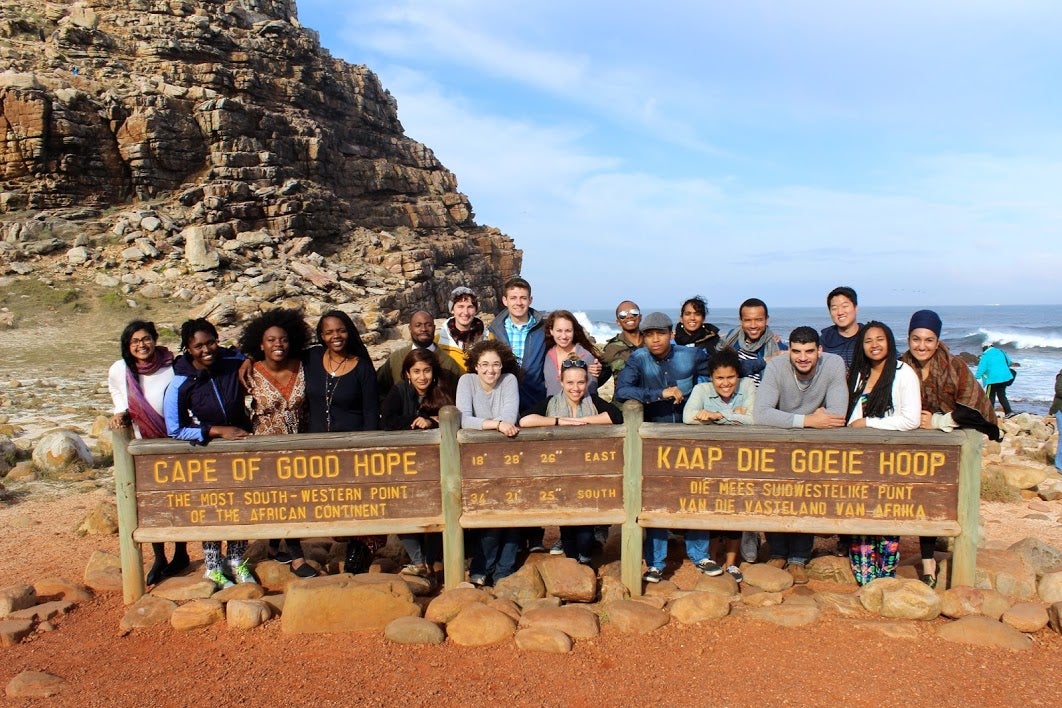Faith – Nesha Z. Haniff
“We Were Different not Divided”
Video link: https://youtu.be/SukQ8LJqPtw

We meet every night for reflection, discussion and classes. Everyone talks about their days, their perspectives on their experiences and I respond when they have all finished. Largely I use this time as an opportunity to challenge their analyses and to reflect back to them how their many privileges unconsciously insert themselves in their reflections. I am always struck by the penchant for negativity, that they could have had the most transformative experience but dwell largely on the one negative thing that happened.
These students were thrown into the front lines of HIV in South Africa and had to find the courage and bravery to teach in English a methodology of HIV prevention which their students had to teach back in Zulu, Xhosa or any of the languages they spoke at home. This required my faith that they could do it, their faith that their South African students could successfully accomplish this, and most importantly faith in themselves. When their South African counterparts did teach back the module in Zulu and Sotho or Xhosa even better than they were taught in English, it became a transformative moment. That this was possible, that faith and trust in the people is not just theory but praxis. One must act on faith. It is not enough to write or to speak but to live the ideas – to act, to do, to risk.
“They talk about the people but they do not trust them and trusting the people is the indispensable precondition for revolutionary change.” – Paulo Freire
On the 14th of June the group went to Cape Point, the most southern tip of Africa also called the Cape of Good Hope, where the Indian and the Atlantic oceans meet. This reminded Sami of his trip to Ras el Bar in Egypt where the Mediterranean Sea and the Nile meet. There he saw the dividing line between the Nile and the Mediterranean but he saw no such line at Cape Point. In his comments that evening he reflected on POA and the four weeks they had spent together. He was leaving a day earlier, and wanted to share his feelings and analyses. He talks about his concientization and then he quotes this verse from the Quran:
Surah Al-Rahman (The Most Merciful): Chapter 55 verses 19-20
(19) مَرَجَ الْبَحْرَيْنِ يَلْتَقِيَانِ
Marajal bahrayni yalta qiyaani
He released the two seas, meeting [side by side];
(20) بَيْنَهُمَا بَرْزَخٌ لَآ يَبْغِيَانِ
Bainahumaa barzakhul laa yabghiyaan
Between them is a barrier [so] neither of them transgresses.
He relates this surah to POA by saying that unlike the two bodies of water which are separated, by the salinity of the waters which could also be divine intention, that POA, which was marked by difference and diversity, had no such dividing lines. We were all able to form one cohesive body, never mind that Sami is an immigrant from Palestine, that our group had White and African Americans, that Harleen was of Sikh parentage and Melani, Sri Lankan and Danny of Korean descent, we were all one. We converged like the Atlantic and the Indian oceans; we were different but not divided.
In this moment we were beneficiaries of Sami’s consciousness and faith. He was shaped by his Muslim faith which became a seamless part of POA. These are the iterations of faith in POA. How beautiful is this I thought.

